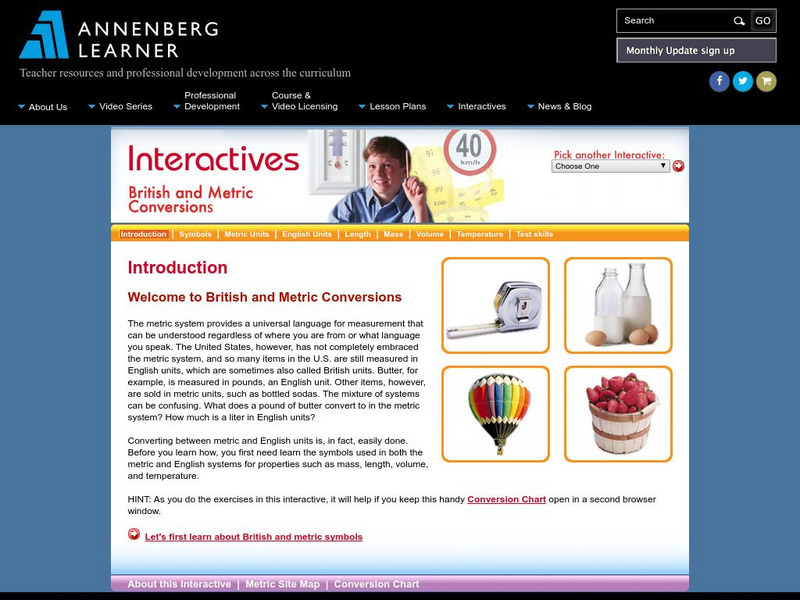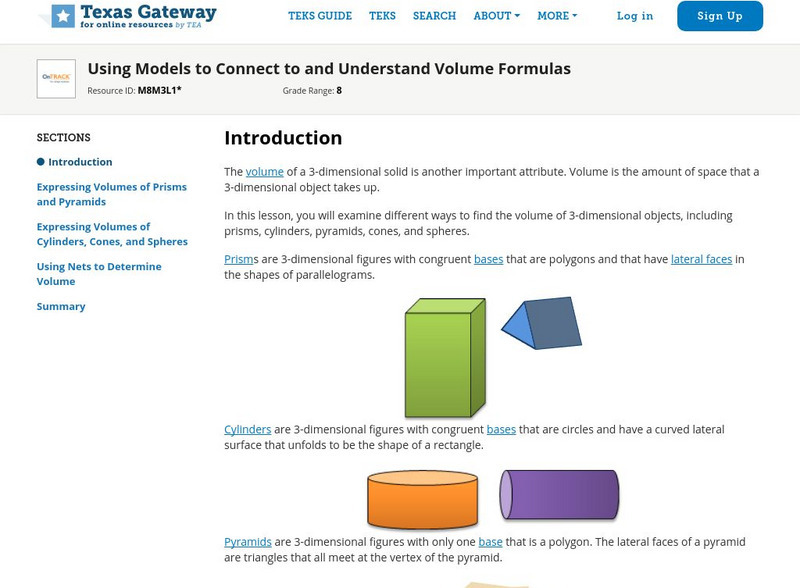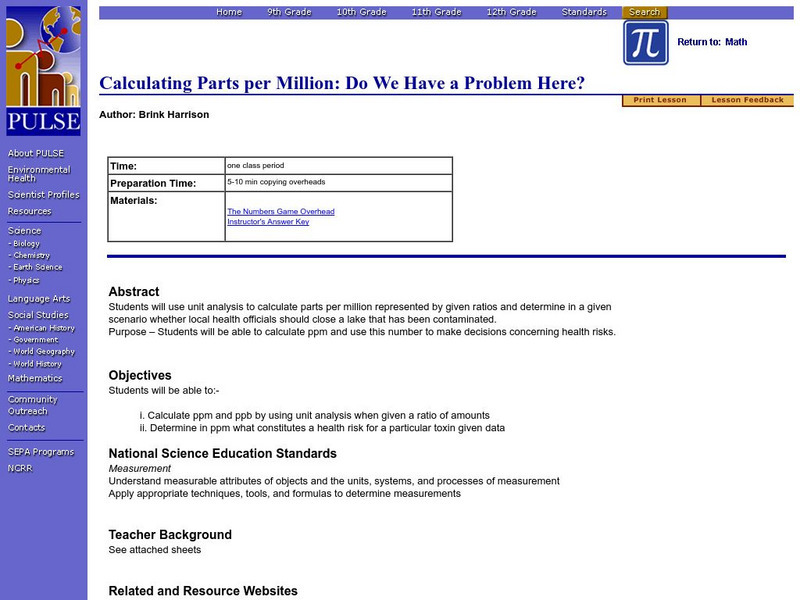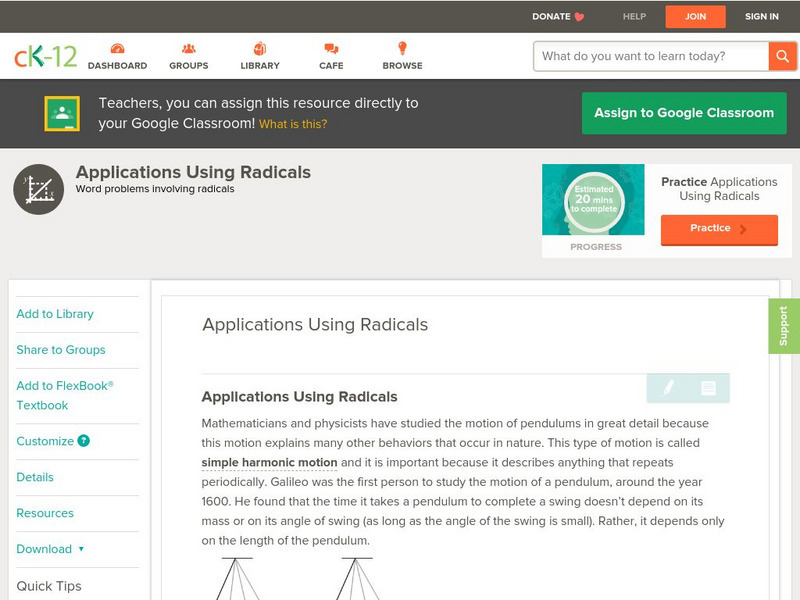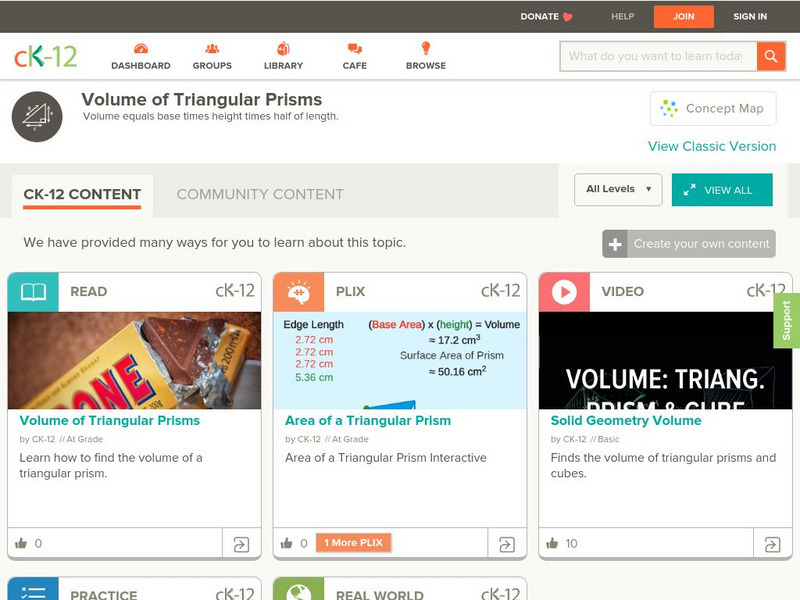Curated OER
Who Has the Biggest Mouth?
Students divide into groups of three or four, elect in their group who they think has the biggest mouth. This question will be followed by Mrs. Peters' joke about big mouths and frogs. Students then be asked how they could prove to the...
Curated OER
Science: Liquid Matter
Second graders examine the properties of liquids and their classifications. They compare and contrast cups of different liquids and record their findings in journals. Students observe how liquids flow at various speeds and that unlike...
Curated OER
Rocks, Their Mass and Volume
Young scholars measure volume using water displacement and mass using a balance. Once they have calculated these two values they will then calculate density while at the same time working on long division. After the activity and...
Curated OER
Surface Area and Volume of a Cube
Students explore finding the surface area and volume of cubes and cylinders. They construct similar three-dimensional figures from a two-dimensional drawing. Students derive the formula for volume and surface area through examination...
Curated OER
Causal Patterns in Density Phenomena
Students define density as a relationship. Through experimentation, they explore the association between the mass and volume of pure substances. Students create a data plot and analyze the patterns between mass and volume. Students...
Curated OER
Relational Causality
Learners explore volume and pressure. Through an activity, students discover what happens in situations when volume is increased but no additional air is able to enter the enclosed space. Learners create models and explain their...
Curated OER
Geometry - Measurement
Students review the procedure for determining appropriate types of measurements for given situations and measurement conversions. They figure perimeter, area, and volume of 2 and 3 dimensional objects.
Curated OER
PD-ROM 2.2: Our Quad Needs Sod (Ms. Ana England)
Students use formulas for common geometric shapes in order to solve a real-life, multi-step problem. They calculate material cost based on price/sq. unit.
Curated OER
Million Dollar Gift
Third graders create a box big enough to hold a million dollars. This is a project fun to do near the winter holidays with inexpensive gifts included in the boxes. This hands-on instructional activity very effectively demonstrates the...
Curated OER
Temperature and Solubility
Students experiment to see how the solubility of a solid changes as water temperature changes. They graph the results of the solubility tests.
Annenberg Foundation
Annenberg Learner: British and Metric Conversions Interactives
The resource assesses students on British and metric conversions. There are tutorials on metric units, length, mass, volume, English units, symbols, and temperature. There is also an introduction and an interactive activity to test the...
Texas Education Agency
Texas Gateway: Using Models to Connect to and Understand Volume Formulas
[Accessible by TX Educators. Free Registration/Login Required] The student will use models to develop formulas and connect them to the volume of prisms, spheres, cylinders, pyramids, and cones.
That Quiz
That Quiz: Practice Test: Geometry
This resource allows users to test their geometry knowledge.
National Council of Teachers of Mathematics
The Math Forum: The Cylinder Problem: High School Lesson
Using an engaging approach, this lesson requires students to record the volume of cylinders as a function of the radius. Students will construct and measure the volume of several cylinders and then begin comparing these shapes.
University of Arizona
Math Lesson: Calculating Parts Per Million: Do We Have a Problem Here?
Twelfth graders test solutions to determine the parts per million and whether a lake is contaminated.
Other
Uss Constitution Museum: How Much Stuff Can Constitution Hold?
The lowest part of USS Constitution was called the hold and it was there that sailors stowed the many goods needed to keep the ship afloat and to feed the 480 men who served aboard for months at sea. For this lesson students use the...
Exploratorium
Exploratorium: Salt Volcano
By making oil float on water--with the help of other ingredients--students can create a lava-lite effect.
Sophia Learning
Sophia: Ideal Gas Law Equation Examples: Lesson 1
This lesson will present several example math problems utilizing the ideal gas law. It is 1 of 2 in the series titled "Ideal Gas Law Equation Examples."
CK-12 Foundation
Ck 12: Algebra: Applications Using Radicals
[Free Registration/Login may be required to access all resource tools.] In this lesson students use radical equations to solve area and volume problems.
Sophia Learning
Sophia: Discovering Volume
This video lesson introduces the concept of volume by relating it to area. The tutorial provides detailed examples.
CK-12 Foundation
Ck 12: Geometry: Volume of Triangular Prisms
[Free Registration/Login may be required to access all resource tools.] Find the volume of triangular prisms by using formulas.
CK-12 Foundation
Ck 12: Fifth Grade Science: Physical Science: Matter, Mass, and Volume
This learning module discusses the definition of matter and what mass and volume measure. Module includes pictures, videos, and review questions.
CK-12 Foundation
Ck 12: Geometry: Volume of Cylinders
[Free Registration/Login may be required to access all resource tools.] Find the volume of different cylinders using formulas.
Shodor Education Foundation
Shodor Interactivate: Function Revolution
This activity allows the user to find the volume and surface area of various functions as they are rotated around axes. This applet can be used to practice finding integrals using the disk and washer methods of calculating volume.












